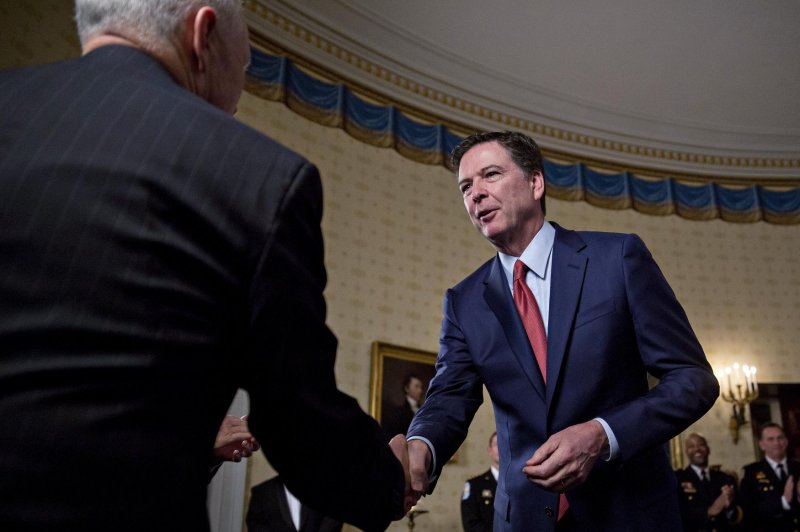FBI Director James Comey meets with U.S. Vice President Mike Pence during a reception for law enforcement officers and first responders at the White House on January 22. Thursday, Comey reportedly met with eight top congressional leaders to discuss concerns about Russia and a claim by President Donald Trump that former President Barack Obama had his New York headquarters bugged before last year's election. File Photo by Andrew Harrer/UPI/Pool |
License Photo
March 9 (UPI) -- The head of the Federal Bureau of Investigation met Thursday with a group of top congressional lawmakers to discuss a slate of concerns, ranging from Russia to President Donald Trump's accusation the previous administration planted listening devices inside his Manhattan headquarters.
FBI Director James B. Comey met with the so-called "Gang of Eight," a group of senior-level congressional members cleared to receive secure briefings, in both the House and Senate.
The bureau chief met with Sens. Mitch McConnell, Chuck Schumer, Richard Burr and Mark Warner in the Senate, and Speaker Paul Ryan and Minority Leader Nancy Pelosi, and Reps. Adam Schiff and Devin Nunes in the House, NBC News reported.
The issue perhaps most on lawmakers' minds was the president's allegation last week that former President Barack Obama wiretapped Trump Tower in New York City before the presidential election -- a notion roundly dismissed by multiple experts and the 44th president himself.
Trump first raised the issue Saturday with a tweet that called Obama a "bad (or sick) guy" for ordering politically motivated wiretaps in the building. The House Intelligence Committee is investigating the allegation, along with potential ties between Trump's administration and the Russian government.
Skeptics have dismissed the allegation as a trumped-up charge, intended to funnel attention away from what's recently been a difficult news cycle for the president's administration.
As for Trump being the subject of an inquiry involving Russia, the White House said Wednesday it's not true. The Justice Department, though, refused to confirm or deny the denial.
"No comment," a department official said.
Earlier this week, Comey asked the Justice Department to publicly deny that Obama had Trump Tower bugged. The request was declined.
It's unclear what Trump's allegation is based upon and the president has yet to provide any evidence to support it. Through a spokesman, Obama immediately rejected the imputation -- as have others, including former national intelligence director James Clapper.
"Absolutely, I can deny it," Clapper told NBC News on Sunday, noting that he would certainly have known about any attempt to bug Trump's campaign.
Members of Trump's administration and congressional Republicans have largely refrained from repeating, or even addressing, the president's allegation. Some observers say the Justice Department now needs to debunk the charge or furnish some evidence for it.
Trump's accusation could be based on recent reports by certain media outlets, including Breitbart News, that the former administration unsuccessfully sought two Foreign Intelligence Surveillance Act warrants last year involving a computer server inside Trump Tower.
Those reports, though, have had difficulty standing up to increased scrutiny.
At Thursday's meetings, Comey also discussed with lawmakers ongoing concerns that Moscow attempted to interfere in the U.S. presidential election.















